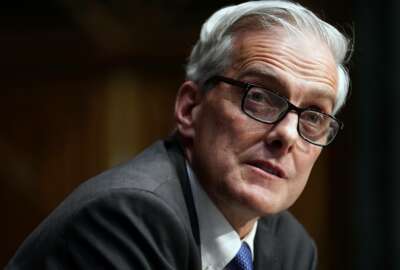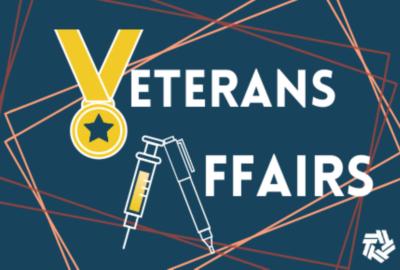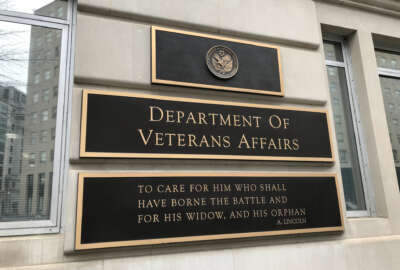What’s it like to be career and the number two medical officer at VA
"The Veterans Health Administration truly provides great care for veterans. That's why we encourage veterans to come," said Steven Lieberman.
Federal senior executives are often well known in their agencies, but toil in obscurity as far as the public’s concerned. My next guest is a physician, senior executive and the deputy under secretary for health at the Veterans Health Administration, Steven Lieberman. He’s among this year’s Senior Executives Association’s people of the year. As part of our ongoing series on the Federal Drive with Tom Temin.
Interview transcript:
Tom Temin And they aren’t specific about what people did, but what do you think got you the award this year?
Steven Lieberman I think it’s a career of achievement and just a long history of working in VA facilities. First in direct health care, caring for veterans, assuming increasing leadership positions, and then assuming a national level overall.
Tom Temin And I’ve always wondered, and I have asked VA secretaries this that have been physicians and also high level people in additional agencies to call up, for lack of a better word. And that is, what is it like to drift away because of increasing managerial responsibility from the craft or the art that got you into the field? That is the practice of medicine itself.
Steven Lieberman That’s a good question. Certainly I went into health care because of my love of the idea of taking care of patients. And I was fortunate for almost all of my career to continue to take care of patients. I think it was important for me to experience firsthand what it was that brought me into health care. I work in the intensive care unit, and I continued to do so. And did it all the way up until the time of the pandemic. And again, it’s that gratification to work. But also it exposed me firsthand to the challenges that staff are facing. What do I need to work on to optimize health care for veterans? And also gave me credibility that folks knew me directly. So there definitely was a benefit to continuing that for a long period.
Tom Temin And you’ve kind of got to keep up with two different things. There’s VA policy and VA procedure in a vast organization like that is something that you both direct but also has to keep up with. But then in the field of medicine itself, attitudes, best practices. What is considered state of the art changes with respect to the balance of physical and mental and all of these things? And so how do you stay close to what is state of the art such that you can have an empathetic conversation with that physician or that VA medical Center director?
Steven Lieberman Yeah, that is really important. And so I do a lot of reading in my spare time, do trainings, and also keep my board certification up to date. And so there are a lot of requirements for that. But it really is just going back to the books and studying and keeping abreast of what is the latest and greatest.
Tom Temin And how long have you been at VA?
Steven Lieberman I have been at VA for over 30 years.
Tom Temin Wow. And so that’s been what you have always done.
Steven Lieberman Yeah. I also worked at hospitals in the private sector in the Boston area for up to several years. And I think that helped balance my experience here and gave me the help be a part of who I am.
Tom Temin And what would you say then for that physician that’s like up the street from VFW Parkway, you know, somewhere in the Boston area. What’s the attraction? What attracted you to Veterans Affairs in the first place? Because 30 years ago it didn’t quite have the reputation it has today.
Steven Lieberman It’s always been the greatest mission, I would say, in the federal government. The best mission anywhere are to care for those that have served us, to serve those that have served us. And that’s what drew me to it. Also, the VA is an outstanding place to build a career, not just the great clinical care experience and caring for veterans, but also most VA’s almost all have academic affiliations, so you get to do teaching. We’re the largest trainer of any health care organization in the United States. And similarly, research. We are the largest researcher in the United States. And so it also gives you the opportunity to delve into that area, if that is an interest to you.
Tom Temin We’re speaking with Dr. Steve Lieberman. He’s deputy undersecretary of health at Veterans Health Administration, and a senior executive of the year per the Senior Executives Association. And as the deputy undersecretary for health, you work for a very dynamic and visible Under Secretary Shereef Elnahal. How do you divide the duties? Is he mainly concerned with budget, public affairs, congressional relations and you with the actual medicine side? How does that work?
Steven Lieberman It is very fluid. It depends what our high priority is going on. I am certainly the person who focuses on the day-to-day challenges, things that come up at medical centers across the country. Priorities that need an extra special touch, if you will, where there may be challenges that are being faced. And so I will delve deeply into those. But certainly Dr. Elnahal also gets very involved in high priority areas. And I would say we just divide and conquer. We don’t have an exact formula, but we look at each other and kind of sometimes he says can you take this? And we have a very good relationship that way, and that’s how we do that.
Tom Temin And as a long serving senior executive, what’s your first thing that you tell the new political when they come in? Because they do come and go.
Steven Lieberman I think what’s most important is to remind them or make sure they’re aware that VA has, the Veterans Health Administration truly provides great care for veterans. That’s why we encourage veterans to come. That’s why we have over 9 million veterans enrolled for care. That study after study shows that for veterans, quality of care is usually superior and if not equal than the private sector. And then also veterans satisfaction is higher than in the private sector, and that this really is a great place that we train. Up to 70% of physicians currently practicing in the United States. Large numbers also have psychologists and pharmacists and every specialty you can think of. And also our role with research is really important. And also talk to them about our fourth mission in VA, which is to be the backstop to the health care system in this country when there is an emergency going on, such as during the pandemic or following hurricanes or other mass disasters. And so the VA is always there in the background helping out and supporting this country.
Tom Temin And as a physician at a high level in VA, do you participate in the organizations and the associations generally that involve all medical practice?
Steven Lieberman Absolutely. We do get involved in many different important organizations where we interact with the best of the best and educate them on the state of the art things that are going on at the VA.
Tom Temin And have you ever felt the urge to go back in the private sector simply because at the level you operate in at VA, you’d make a lot more money in the private sector at that level.
Steven Lieberman Every once in a while you assess your career and think about what makes the most sense for you, and certainly have considered different opportunities that have come along. But at the end of the day, I always get pulled back to VA again because it has the best mission and you can accomplish so much and make a difference in the lives of the veterans that we serve.
Tom Temin And how much time do you spend traveling to the medical centers and facilities and kind of walking around?
Steven Lieberman I try to balance that with all the work that goes on, but I try to get out there intermittently once in a while because it is important to hear directly from folks. Since I’ve been here for a long time, folks are pretty comfortable in reaching out directly to me. So I get emails or phone calls every day with individuals who voice suggestions for improvement concerns and different things, and I find that very beneficial.
Tom Temin So you can make things happen or encourage things to happen before, say, the inspector general finds out.
Steven Lieberman Absolutely, we can make changes very quickly, which is really gratifying.
Tom Temin And briefly review what your own medical practice was in some detail and how do you keep up with that and how that’s changed in the 30 years you’ve moved up away from direct medicine.
Steven Lieberman So I’m a pulmonary and critical care specialist. So I take care of patients that have lung conditions as well as patients that require hospitalization in an intensive care unit and have worked in that area for a good many decades. And it is challenging to keep up with with all that changes. But fortunately with time, there are many tools available to us to to pay attention to the most important changes. I am still board certified employment in critical care medicine and we’re required to do a lot of training. And that’s that’s also important for my job to stay on top of things and helps me to relate to those individuals that I have to interact with.
Tom Temin You must be glad that the military no longer puts cigarettes in MREs and that kind of thing. Those days are long gone.
Steven Lieberman It is good that there is no longer an encouragement of smoking, absolutely. But it is still a big issue for health care. Smoking is still going on, but fortunately, it’s on a decrease. But absolutely.
Copyright © 2025 Federal News Network. All rights reserved. This website is not intended for users located within the European Economic Area.
Tom Temin is host of the Federal Drive and has been providing insight on federal technology and management issues for more than 30 years.
Follow @tteminWFED






